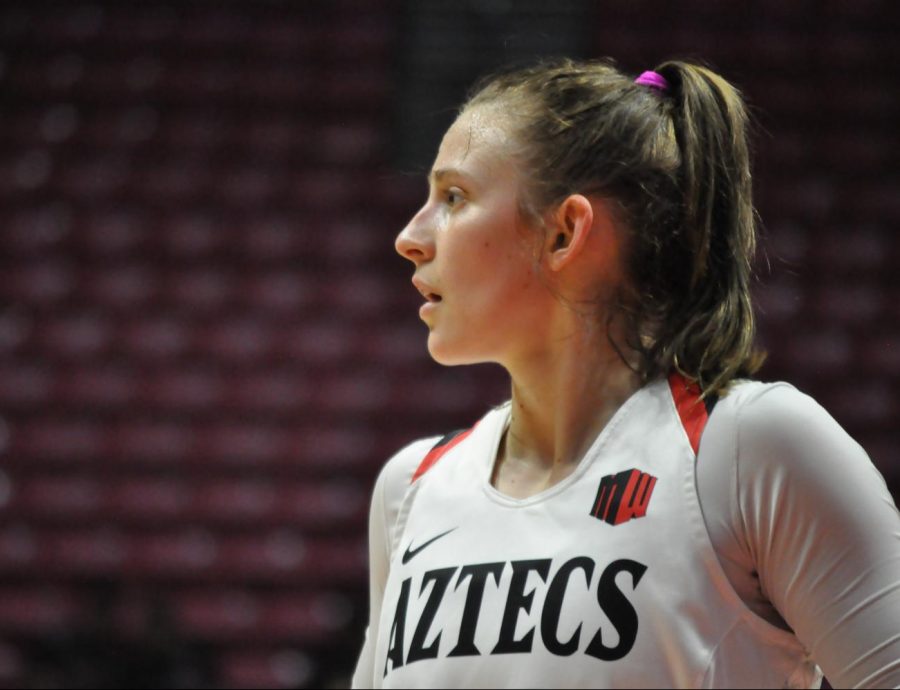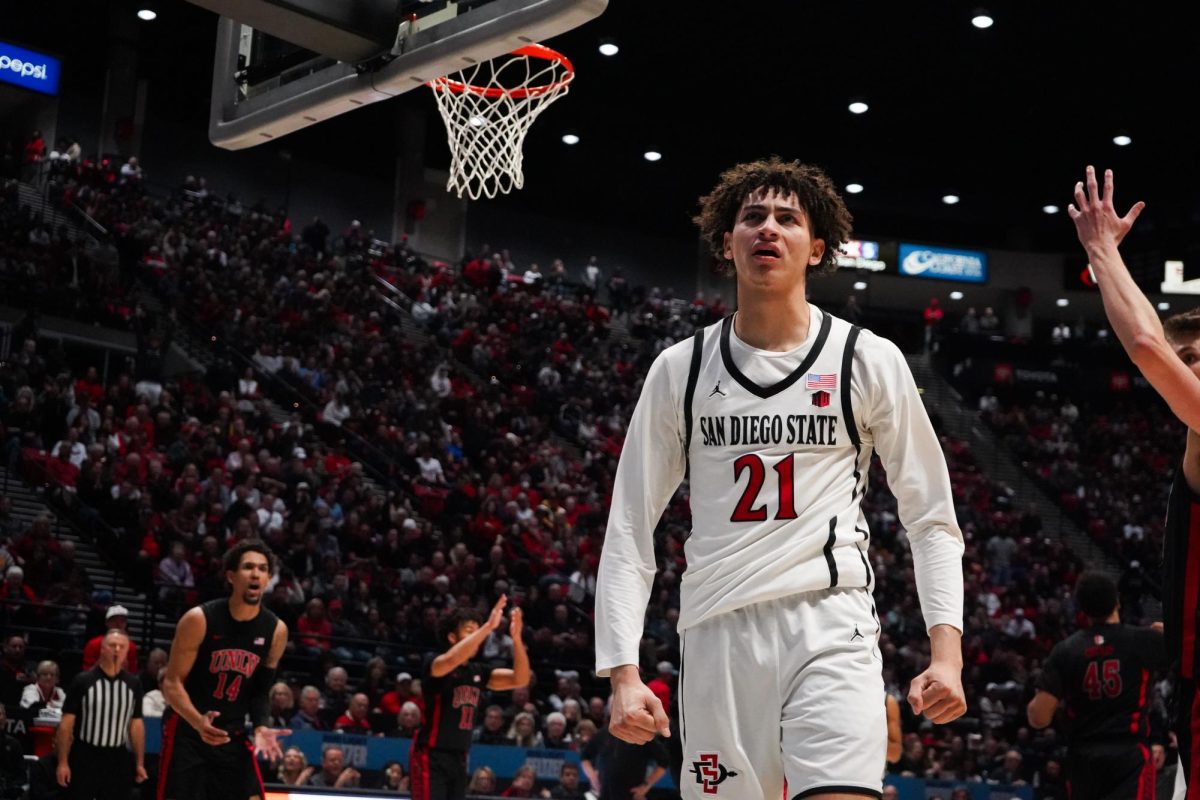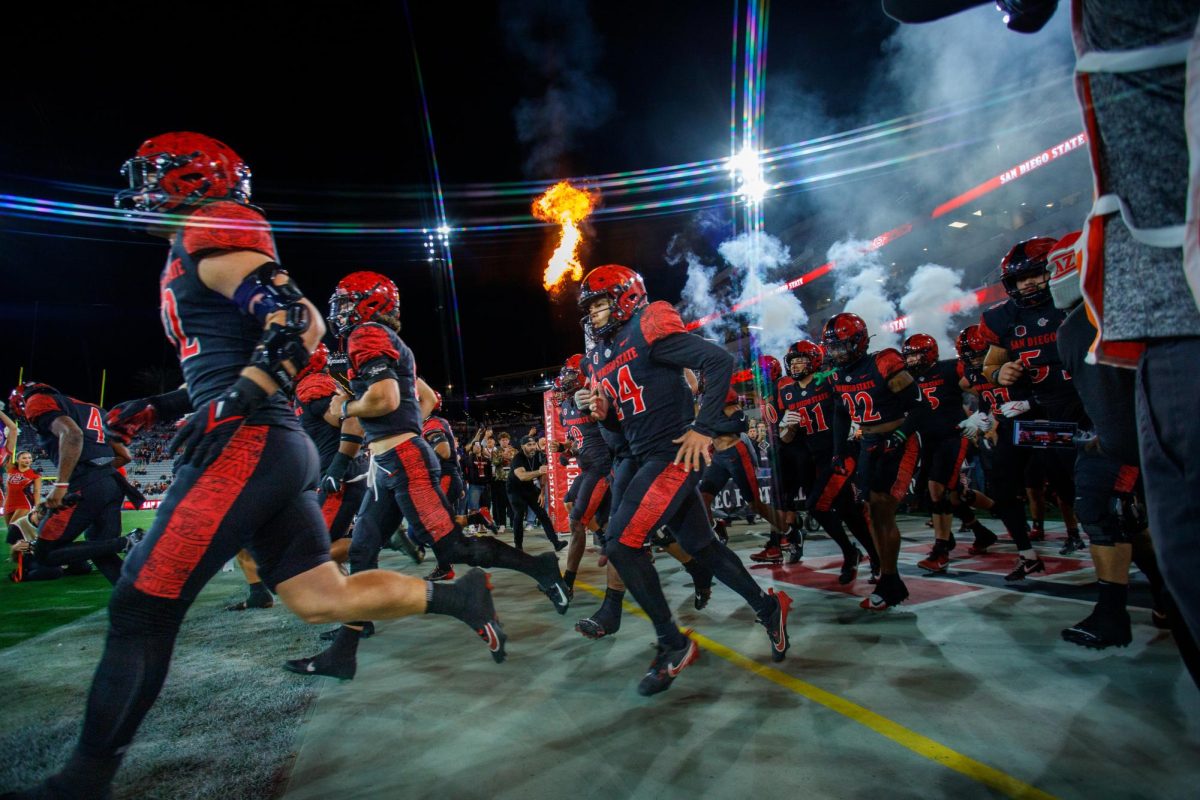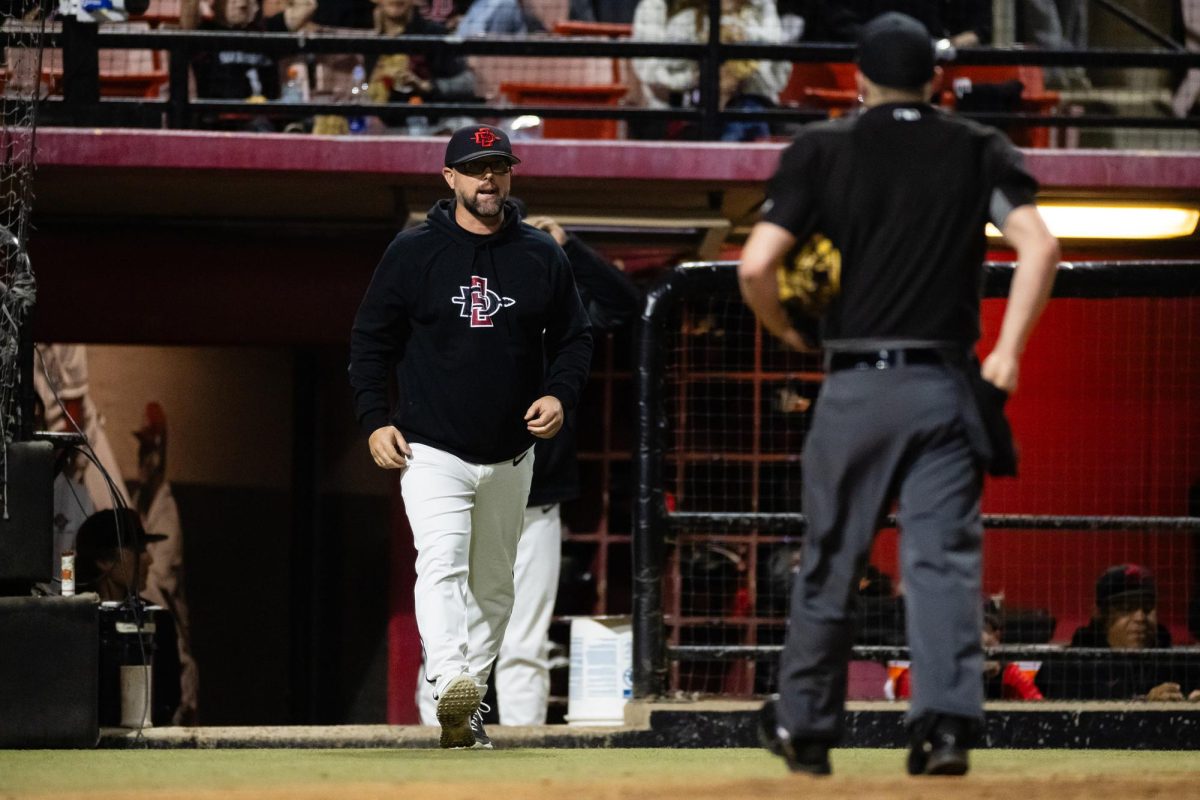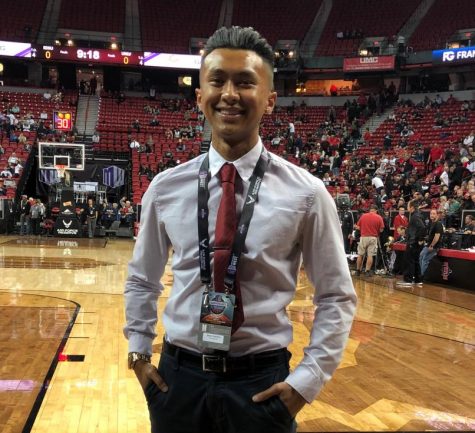If you want to talk about making a splash across women’s basketball in the Mountain West Conference, look no further than San Diego State senior guard Taylor Kalmer.
After transferring from one of the Pac-12’s prominent programs in Oregon State, Kalmer took a leap of faith and transferred to join the Aztecs for her final year of eligibility.
There’s a saying, “no risk, no reward,” which Kalmer did only to see it pay off this season.
For starters, Kalmer fit right into SDSU’s system where she led the team in scoring (15.7 points per game), minutes played and three-pointers made (45).
“This season was just amazing. It was more than I could’ve asked for. I’m so appreciative of the coaching staff and team for welcoming me into this situation for helping me grow on and off the court,” Kalmer told The Daily Aztec. “It exceeded my expectations. I absolutely have no regrets. I left it all out there on the court and had so much fun.”
The 5-foot-8 guard tallied 1,176 minutes — the most in the MWC and seventh-best in the entire nation, according to the NCAA Division I women’s basketball statistics.
Kalmer, an Arizona native, enjoyed turning up the heat as she scored double digits in 29 out of 31 games, including 25 consecutive games to close out the career of No. 25, which is the longest streak ever by an Aztec in the MWC era (1999-present).
Seven contests ended with 20 points or more scored. She set a new career-high 22 points against San Jose State on Dec. 7, 2019 and tied it on three other occasions.
Kalmer’s 486 total points accounted for slightly below one-fourth (24.6%) of the Aztecs’ 1,975 points this season.
A top-five MWC scorer and top-10 leader in field goal percentage, Kalmer was as reliable a player as they come. Her efforts earned an honorable mention in this year’s All-Conference team accolades.
Not only an efficient scorer, but she also carried versatility in other aspects of her game with ball vision, rebounding and defensive presence.
Kalmer proved to have ice in her veins when it mattered most. To her credit, she had the second-most game-tying threes in the final minute across collegiate women’s basketball.
One signature moment came on Jan. 8 against the Wyoming Cowgirls.
In a down-to-the-wire matchup of the Wild West, the Aztecs found themselves down by three with a few seconds left to spare in regulation. The play drawn up coming out of the huddle was botched, yet the ball landed in Kalmer’s possession.
With two sets of bodies guarding her and no time to regroup, Kalmer instinctively hit the iconic shot of shots that erupted Viejas Arena and forced the game into overtime. The Aztecs went on to win in the extra period.
Any spectators in attendance that evening (including myself) will tell you they still feel the chills of that moment.
Kalmer was like no other when it came to playing the game of basketball. She defined what it meant to play with heart while maintaining a “never say die” type of attitude.
Lessons learned through playing basketball
As much as her game and accolades speak over the years, basketball is not what defines who Kalmer is. One of the big takeaways she mentioned from her journey is understanding that sport should not overcast who you are as a person.
“I learned that through basketball there are life lessons I developed and can take with me after college,” she said. “I matured and grew up to learn that basketball is not my identity but rather those qualities I developed through basketball are part of my character, and that’s really cool to see.”
Kalmer explained every athlete playing any level of sport can be consumed by the time and effort being put into their passions. Yet, taking a pause and spending moments away gave clarity so that it wouldn’t embody her personality.
“You get so consumed by your sport that it seems like that’s just who you are and all you do,” Kalmer said. “Being away from basketball, I learned that you still have the things that drive you and carry those same qualities that I can take with me in whatever I’m doing.”
Giving back and helping the next generation
Kalmer often appears as a fierce competitor on the court, but off the floor lies a sincere and heartwarming individual. It was never uncommon to see her help around the local community, oftentimes participating in events that connected with the youth.
Last December, she along with many other collegiate and professional athletes participated in the Junior Seau Foundation’s 25th annual ‘Shop with a Jock.’ The event highlights underprivileged children from the San Diego Boys and Girls club who are awarded gift cards to shop for Christmas presents.
“I have been able to understand that I am bigger than basketball,” Kalmer said. “Anytime you have fans with little girls coming up to you it’s a reminder that you’re doing it for them. They’re looking at you for inspiration and watching your every move even when you think nobody is watching. Trying to uplift people is something I work on doing every day.”
Former Aztec women’s basketball player Courtney Clements recently reached out to Kalmer and asked if she would speak with players on Clements’ youth basketball team.
Without hesitation, Kalmer knew she wanted to reach out and help.
“I found it so humbling just to know these girls are taking notes and asking me questions,” she said. “Just to help them and give advice on college, athletics, time management and work ethic was so rewarding to see.
“I was able to give back and see that these girls truly cared. They want to play someday and right now anything that I can do to help them grow both on and off the court is an amazing experience.”
Support received through family, friends, teammates, coaches and importance behind her relationship with God
A college athlete’s typical day isn’t just dealing with their sport but rather becomes a juggling act having to worry about school and life in general on top of it. Kalmer said the pathway student-athletes experience is by no means easy.
Through the ups and down however, she said being surrounded by the love of her peers and God is what pushed her through.
“I’ve been very blessed with some amazing people around me like the coaching staff and my teammates,” Kalmer said. “I know that both verbally and physically my family was there to support me, but the most important relationship I’ve had is with God. For those of us who go through struggles, lacking guardians or close friends I would encourage people to lean on God because at the end of the day he’s got your back 24/7.
“There were a lot of times before games I would rely on him for prayer just to keep my faith in that. God is what helped me get through the season. All credit goes to him, but I had the blessing of having others around me as well. I’m thankful for all those people,” she said.
During her two years on the Mesa, Kalmer expressed that she vastly improved both her character and as a player.
“When I first got here, things were different because I was coming from another school and team so I had to make an adjustment in adapting. I had to learn how to build relationships with everyone and how to talk to people on the court,” Kalmer said. “I learned how to support people and how to be a leader because verbally at first I wasn’t like that in communicating.”
“This team helped me both on and off the court. I’ve developed some amazing relationships on the team and I know a lot of these players I’m going to communicate with forever as well as the coaches,” she said. “These relationships are so important and bigger than basketball. It’s been so fun growing with those girls because I see the shift in maturity and in our games.”
Transferring to another program
One of the remarkable storylines told this season was the success behind transfer players like Kalmer and men’s basketball players like junior guard Malachi Flynn, senior guard KJ Feagin and senior forward Yanni Wetzel.
Each took a chance at shaking things up from their previous programs by transferring. Based on the number of conference honors, titles and memorable moments this season one can only imagine it was worth it for these players.
Before making her way to the Mesa, Kalmer spent three full seasons up north at Oregon State University. During the 2015-16 season, she was a part of the Beavers team which made a Final Four appearance in the NCAA March Madness tournament.
Kalmer featured on OSU teams that earned Pac-12 regular season and tournament championships. However, after much thought and consideration, Kalmer wanted to move somewhere closer to home.
One of SDSU’s own players entered the transfer portal last season. The program carried out its role at looking for a potential replacement.
When the opportunity presented itself, the Aztecs welcomed Kalmer with open arms and met all the desires she was looking for.
“When I was in the transition of looking for a new school, I wanted to make sure my boxes got checked off,” Kalmer said. “I wanted to be in a good location, closer to family, develop and get along with a team, have good facilities and find a place where I could have fun in a beautiful city. Those were five of my key aspects.”
Players sometimes hesitate to enter the NCAA transfer portal in fear of not finding the right fit. For many the move means heading to a new city, creating new relationships and at times learning a completely different system.
Kalmer said doing her due diligence to research potential landing spots is what assured her that SDSU was the right choice.
“I think sometimes players can rush into making decisions and emotionally look at something different,” she said. “When you look at things as a whole, that’s when you’ll know it’s the right decision. Thankfully it was really smooth for me and I knew SDSU was the only place I wanted to go.”
Early beginnings, desire for competitiveness and role models
Every athlete’s beginning carries a unique story to be told. Kalmer’s began through her athletic family roots and her early days as a soccer player.
Her brother, Brian Kalmer, plays baseball as an infielder for the Arizona State University Sun Devils which naturally brought a competitive nature between the two siblings.
“I’ve been competitive a lot with my brother,” Kalmer said. “Even today we’re still in the weight room doing three-hour workout sessions trying to beat ourselves.”
After growing old of playing outdoors, she made the switch to basketball through her father, who was a youth basketball coach. Kalmer almost immediately fell in love with the game while her talent started to evolve.
She often found herself as the only one playing with the boys and thrived off of it. Rumor has it some of them are still haunted by the level of physical presence she brought to this day.
“It was so fun to see I was the only girl out there playing against these boys and beating them up,” Kalmer said with a chuckle. “It was just fun competing. Basketball is unforgiving because you can’t control where the ball goes at all times.
“I found it was a challenge like any sport and I stuck close to that. I happened to get good at it and got offers coming out of high school to play for college. It was because of my dad introducing me to basketball.”
While playing in high school and college, Kalmer idolized University of Notre Dame alumna and former WNBA Seattle Storm guard Jewell Loyd.
Through analyzing her game, Kalmer discovered a flame within that would ignite a spark for reaching her highest potential.
“Loyd had this mindset that was different at the time. She grinded and was competitive which I looked up to her,” she said.
Loyd’s closest mentor was the late, great Kobe Bean Bryant. So while Kalmer added aspects of her game similar to the two-time WNBA All-Star, she adopted Bryant’s laser focused “Mamba Mentality” to her mental approach to the game.
Those who follow Kalmer closely have come to know her as the ultimate competitor. It’s that same competitiveness which motivates her in everything she does.
“It’s more on just being competitive with myself. I want to beat what I did yesterday,” Kalmer said. “At Oregon State I saw All-American players right in front of me. I saw what they did to be competitive and work hard.
“I know it’s the little extra things and having that mindset that separates people. They weren’t competing against each other and comparing themselves to other people, they were beating themselves. That’s one of the main things I saw at OSU and brought with me to SDSU. Being around those competitive environments is so healthy for all athletes and individuals.”




